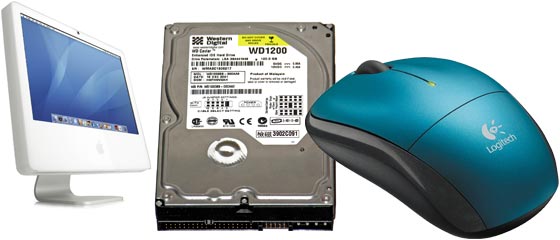 ![[Header]](../XuShared2/Line3.jpeg)

Add a Comment (Go Up to OJB's Blog Page) Simple ComplexityEntry 578, on 2007-07-25 at 16:22:34 (Rating 2, Computers) I just listened to a podcast which discussed simplicity in design, especially of electronic gadgets. In the whole show there were only two companies mentioned: Bang and Olufsen, on one occasion relating to elegant but expensive devices; and Apple on many occasions relating to beautiful and affordable design, especially of the Mac, iPhone and iPod. Interestingly, the interviewer, the interviewee, and some of the other participants all mentioned they use a Mac.
Anyone studying computer use on the Earth through examination of the media might think that almost everyone uses a Mac, they are so prevalent in movies, TV, etc. But the truth is, of course, that intelligent and creative people prefer the Mac and that's why it appears to be so prominent. I guess that's OK. I probably wouldn't want to see the Mac being used for the mundane tasks the inferior platform is used for anyway. I'll be happy once the Mac gets to 10% or 15% market share because then it will be taken seriously by software developers while still being the minority platform.
Getting back to the design discussion. An idea that meant a lot to me was that simplicity on the surface often disguises complexity underneath. As a software developer I can really identify with this. Many of my recent projects could have been completed in less than half the time and still had the same functionality if I hadn't been so dedicated to the idea of user interface simplicity.
Separation of the user interface from the internal functionality of a program is a basic concept in computer science, but many people still choose to ignore the idea. The fact that it involves so much more work to produce the same superficial outcome must make it tempting - in an age where people want maximum profit for minimum effort - to ignore the subtleties of user interface design.
Of course, the software concept is really the same as the gadget design concept, because most gadgets (iPhone, iPod, most cell phones, washing machines, modern amplifiers, DVD recorders, etc) today are really just specialised computers running a custom program. The hardware design is important (the iPod and iPhone controls are a classic case of elegant simplicity) but its the software running behind the scenes which really handles the complexity.
So while Apple continues to follow this design philosophy they will always be the leaders in the area of design. While other companies, especially Microsoft, continue to add new functions to bloated, ugly user interfaces they will always create programs and devices that people have to use but would be happier if they didn't.
 There are no comments for this entry. 
You can leave comments about this entry using this form. To add a comment: enter a name and email (both optional), type the number shown above, enter a comment, then click Add.
Note that you can leave the name blank if you want to remain anonymous.
Enter your email address to receive notifications of replies and updates to this entry.
The comment should appear immediately because the authorisation system is currently inactive.
![[Comments]](../XuShared/Comment1B.jpeg) ![[Preview]](../XuShared/Comment6B.jpeg) ![[Blog]](../XuShared/Up2B.jpeg)
|

![[Comments]](../XuShared/Comment1B.jpeg)
![[Preview]](../XuShared/Comment6B.jpeg)
![[Blog]](../XuShared/Up2B.jpeg)